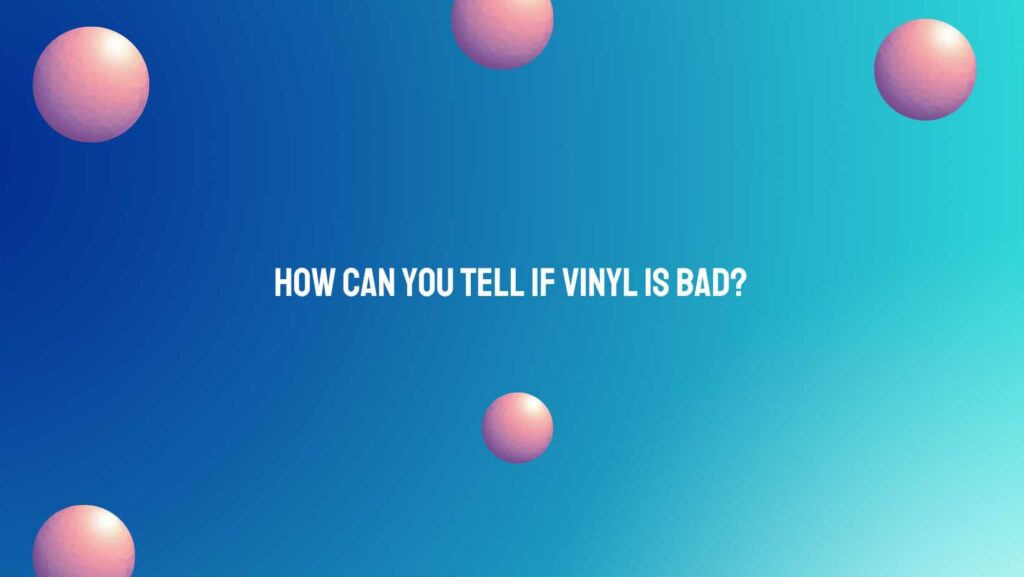Vinyl records have been cherished by music enthusiasts for decades, offering a unique listening experience and a tangible connection to the music. However, like any physical medium, vinyl records can degrade over time, leading to various issues that affect their playability and sound quality. In this article, we will explore common signs and methods to determine if a vinyl record is in poor condition or “bad,” and how to assess its overall quality.
- Visual Inspection
A visual inspection is the first step in assessing the condition of a vinyl record. Here are some common visual cues that can indicate a vinyl record is in poor shape:
a. Scratches: Deep scratches or scuffs on the surface of the vinyl can cause skips, pops, and distortion during playback. Light scratches may be less detrimental to sound quality.
b. Warping: Vinyl records can warp due to exposure to heat or improper storage. A warped record may not sit flat on the turntable, leading to tracking problems and audible distortions.
c. Dust and Grime: Dust, dirt, and fingerprints can accumulate on the surface of the record and in the grooves, affecting sound quality. Excessive grime may require a thorough cleaning.
d. Mold and Mildew: Vinyl records stored in damp or humid conditions can develop mold or mildew, which can cause permanent damage to the grooves and affect playback.
e. Ring Wear and Cover Damage: Damage to the album cover, such as ring wear, seam splits, or water damage, may not affect the vinyl itself but can impact the overall collectible value.
- Audible Issues
Listening to a vinyl record is the most direct way to assess its condition. Here are some audible issues that can indicate a vinyl record is in poor condition:
a. Pops and Clicks: Audible pops and clicks during playback are often caused by dust, scratches, or surface imperfections. Light pops and clicks may be tolerable, but excessive noise can be distracting.
b. Skipping: Skipping occurs when the stylus (needle) fails to track the grooves properly. This can be due to deep scratches, warping, or an improperly balanced tonearm.
c. Surface Noise: Surface noise refers to the constant background noise generated by the stylus moving over the vinyl surface. While some surface noise is normal, excessive noise can be a sign of wear or damage.
d. Distortion: Any distortion in the music, such as crackling, hissing, or muffled sound, can indicate problems with the vinyl or the playback equipment.
- Playback Equipment Evaluation
Sometimes, what may seem like a bad vinyl record can actually be a result of issues with the playback equipment. It’s essential to rule out equipment-related problems by checking the following:
a. Cleanliness: Ensure that both the stylus and the vinyl record are clean. A dirty stylus can introduce noise and distortion.
b. Proper Alignment: Check that the turntable’s tonearm and cartridge are correctly aligned and balanced. Improper setup can lead to tracking problems and record damage.
c. Tracking Force: Verify that the tracking force (the pressure exerted by the stylus on the record) is set to the manufacturer’s recommended specifications.
d. Anti-skate: Make sure that the anti-skate mechanism, if available, is correctly adjusted to prevent excessive lateral forces on the stylus.
Conclusion
Identifying whether a vinyl record is “bad” involves a combination of visual inspection, listening for audible issues, and evaluating playback equipment. It’s important to note that some issues may be repairable, such as cleaning dirty records or adjusting the setup of a turntable, while others, like deep scratches, may be irreversible.
Ultimately, the condition of a vinyl record can vary widely, and collectors may have different tolerance levels for imperfections. For some, the nostalgia and uniqueness of vinyl make minor flaws tolerable, while others prioritize pristine copies for the best possible sound quality. Regardless of your preference, understanding how to assess the condition of vinyl records will help you make informed decisions when buying, collecting, or enjoying your vinyl collection.


